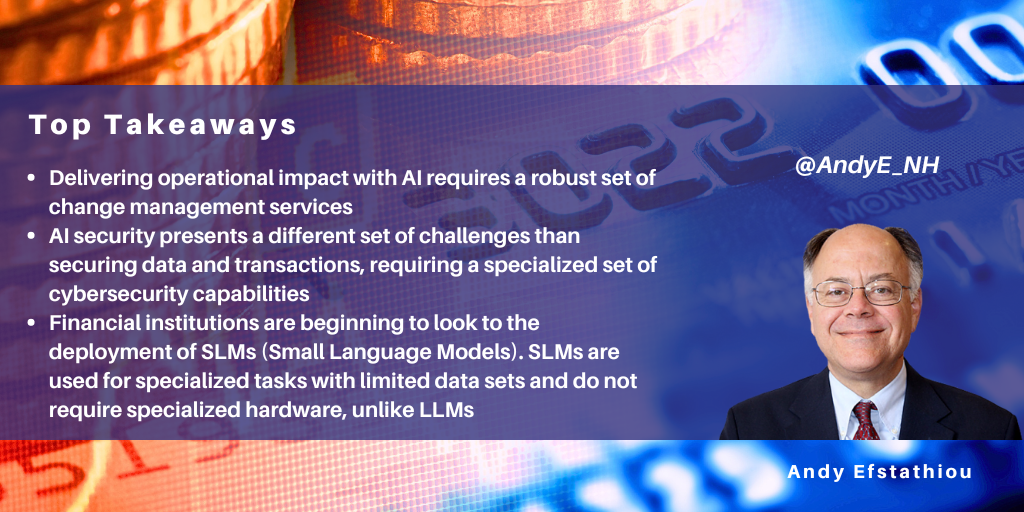Search posts by keywords:
Filter posts by author:
Related Reports
Related NEAT Reports
Other blog posts
posted on Oct 01, 2024 by Andy Efstathiou

At its recent thought leadership forum, Confluence 2024, Infosys set out its roadmap for achieving a leadership position in AI services.
Despite the hype in the marketplace, Infosys finds its clients are taking a thoughtful approach to implementing AI. Clients want to carefully evaluate the realistically achievable ROI if they bring a project to full operational deployment. Once they identify high ROI opportunities, they fix the data infrastructure for a quality analysis. That requires fixing the sourcing, scrubbing, and distribution of data. Next, operationalizing the data analysis requires modernizing workloads, moving the workloads to the cloud, and experimenting with how AI can be applied to those workloads.
Successful application of AI requires leveraging domain expertise. However, to date, most AI vendors lack the domain expertise to enhance the practical application of AI to business workloads. Infosys is applying its industry experience to develop AI-based offerings for real-time payments, digital wealth management, and commercial banking in financial services. These process areas are characterized by higher levels of manual processing and higher customization across banks.
Infosys’ AI investments
Infosys is investing in six areas to build its AI capabilities:
- Data: tools, techniques, and services for sourcing, scrubbing, and analyzing data. Infosys uses its Master Data Management (MDM) solution for these functions
- AI functionality: enhancing its Topaz platform. Infosys is partnering with more Fintech vendors to develop emerging functionality
- Cloud migration: Infosys is enhancing its Cobalt platform and adapting its architectures and cloud delivery to more markets, including expanding its services for the Nordics, Southeast Asia, and the Middle East
- Engineering software services: Infosys has found GenAI very effective in accelerating its software development. It is taking these learnings and enabling client teams, primarily in large enterprises, to accelerate their internal software development. Shorter development times allow faster time to market for new products and quicker responses to cybersecurity threats
- Marketing: Infosys launched its Aster platform of AI-enabled marketing services, solutions, and platforms in June 2024. Currently, the platform has 400 assets and 50 partners
- ESG: Infosys has found that curating data and feeding the model are as important as building the best ESG model. It has accelerated its investment in these foundational aspects of ESG reporting.
Delivering business impact with AI
Infosys has found that a robust set of change management services is necessary to impact operational outcomes with AI. To increase business impact for clients, it is supporting its AI initiatives by:
- Enabling broad-based adoption by growing its AI and GenAI training offerings for its and client employees. These training programs include the application of domain requirements to AI solutions
- Scaling its Fintech partner ecosystem to provide clients with curated access to mid-tier Fintechs who are likely to succeed but do not currently have the scale for most enterprises to investigate. Banks are particularly interested in the vetting of cybersecurity Fintechs
- Providing clients with ready-to-use offerings by building out use cases that can be operationalized and developing productized offerings for tier two and three enterprises
- Building cybersecurity capabilities to secure AI. AI security presents a different set of challenges than securing data and transactions
- Customizing offerings to the unique characteristics of each market (e.g., Nordics, ANZAK, Middle East).
For the banking industry, Infosys is investing more AI resources in developing open banking offerings. Today, open banking is in high demand from European banks. Initially, Infosys is developing embedded finance and trade finance solutions for its open banking portfolio.
Finally, LLMs are in high demand in the financial services industry. However, institutions that have deployed LLMs are beginning to look to the deployment of SLMs (Small Language Models). SLMs are used for specialized tasks with limited data sets. LLMs require specialized hardware and cloud delivery to run. Typically, SLMs can be run on local hardware, often a cell phone, without cloud access. Specialized industries such as financial services will have many applications for SLMs, and Infosys is developing offerings for this emerging trend.
